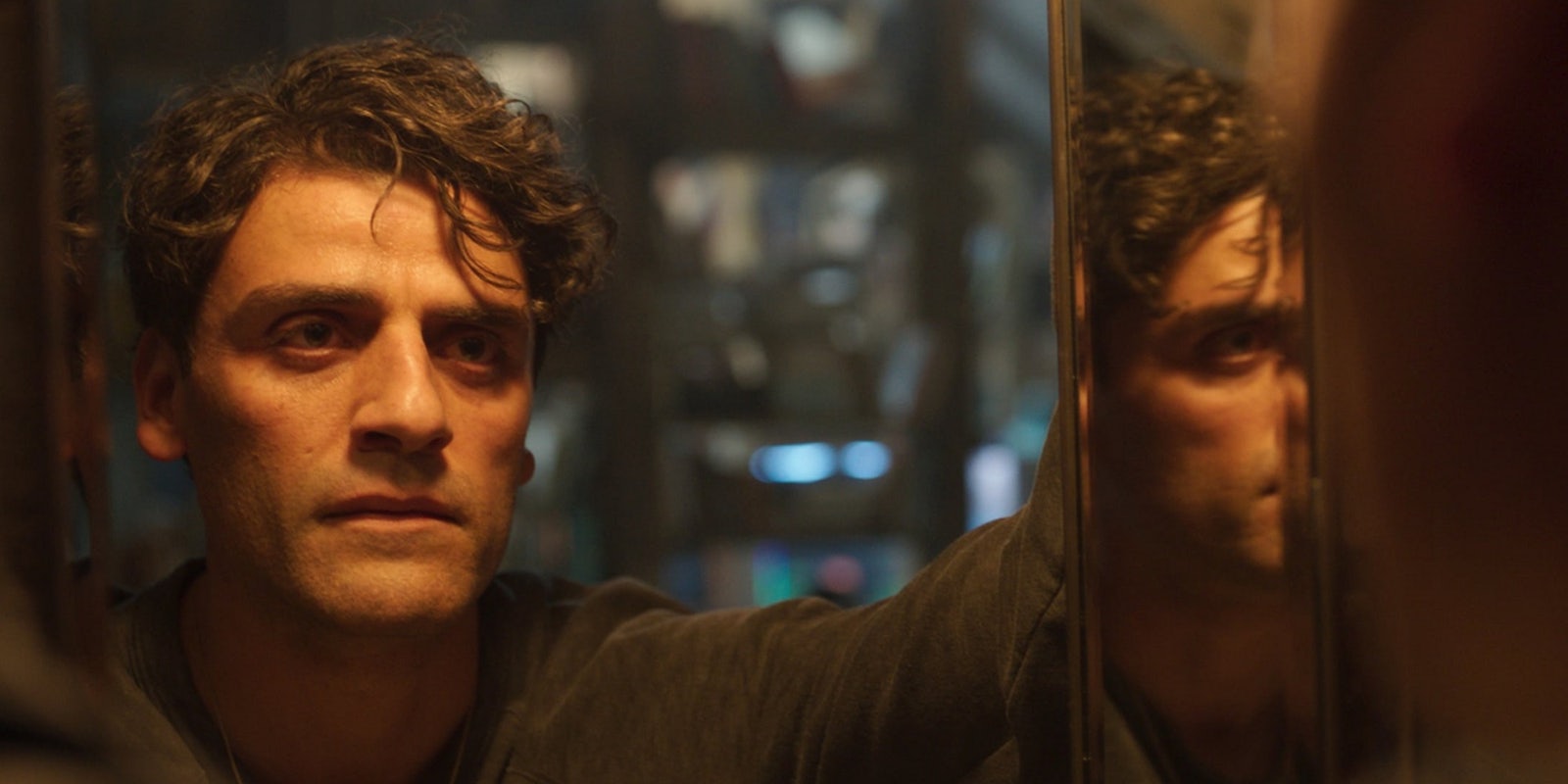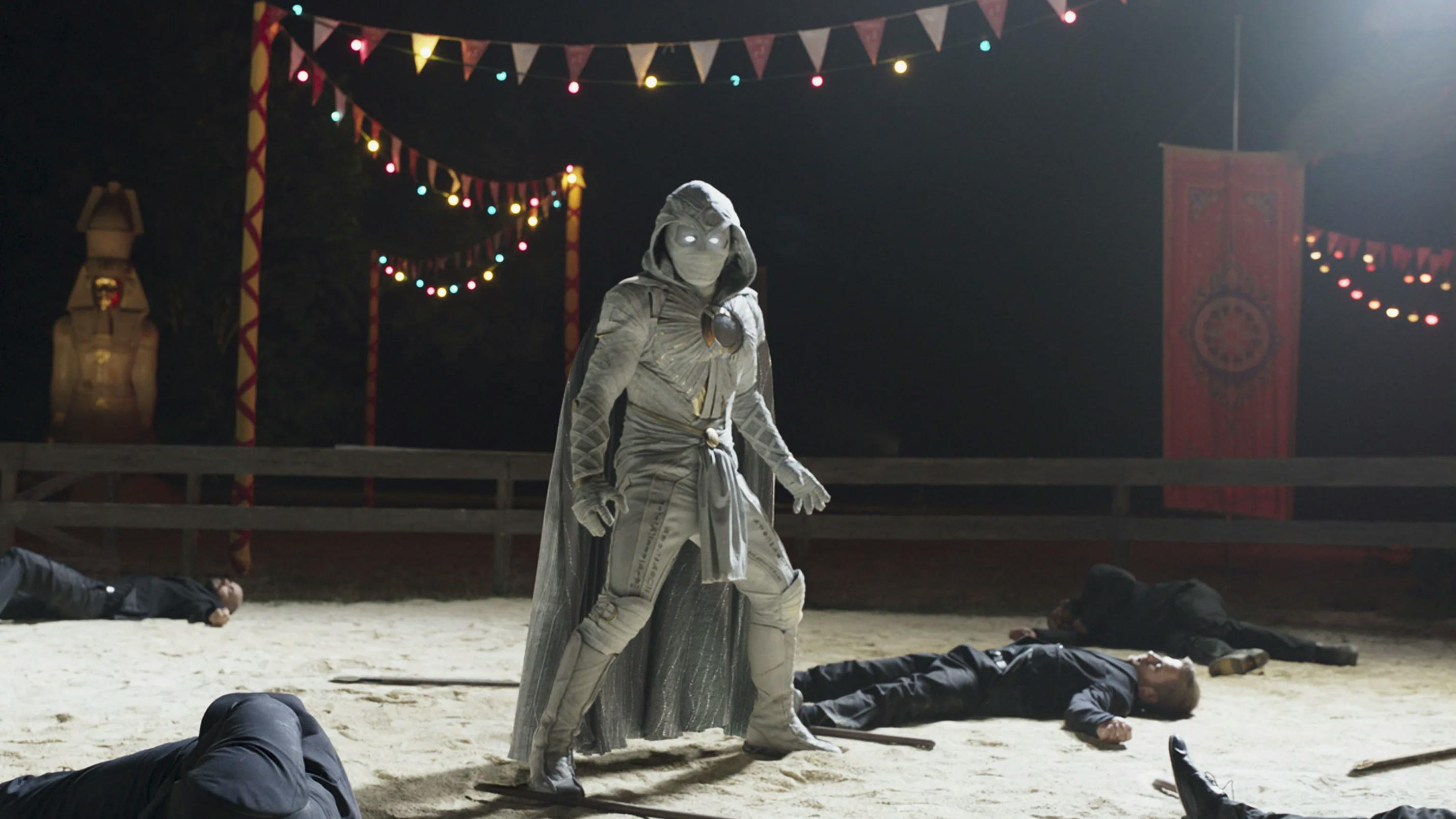This review is spoiler-free.
In the restrictive landscape of the MCU, Moon Knight feels satisfyingly chaotic. Where several recent MCU spinoffs have ostentatiously tried to be weird, this show succeeds by making unpredictable choices. For instance, Oscar Isaac’s much-maligned English accent does (in my humble British opinion!) actually work in context. His zany yet fine-tuned performance is the lynchpin of a show that leaps from comedy to horror to Indiana Jones pastiche—and has shockingly little connection to the MCU at large.
RELEASE: Disney+
Oscar Isaac stars in an unexpectedly quirky adaptation of Marvel’s Moon Knight comics, playing a man with multiple alter-egos including the avatar of an ancient Egyptian deity. Featuring a patchy but entertaining mish-mash of genres, this show succeeds thanks to Isaac’s charm and skill as a leading man.
Moon Knight‘s shtick is twofold. He’s a man with multiple personalities (something the show thankfully avoids diagnosing in realistic medical terms), and he’s the vigilante avatar of an ancient Egyptian deity, providing the basis for his superhero origin story.
The comics tend to focus on his “main” personality Marc Spector, a mercenary, alongside secondary identities including a detective, a billionaire, and a street-smart taxi driver. However, this six-episode miniseries goes in a very different direction, introducing Steven Grant as the protagonist: A nerdy English guy who works in the gift shop at the British Museum.
Steven has no idea that he’s a superhero’s alter-ego. But once he discovers the existence of Marc Spector and Moon Knight, the show quickly begins to resemble Tom Hardy’s Venom: A fish-out-of-water comedy about a twitchy, vulnerable guy being dragged into mortal peril by an uncontrollable entity inside his own head.
Isaac is fantastic here, playing against type as a hapless dweeb. Steven is naive and awkward; simultaneously childlike and visibly middle-aged. His voice is soft and nasal, and his dialogue is peppered with overzealous Britishisms. (Since Steven is arguably a construct of an American man’s mind, the audience can decide for themselves whether he “should” sound authentically English.) When Marc Spector comes into play, Isaac’s entire face seems to change shape. His spine straightens; his jaw tightens with resolve. His hair gets magically neater. It’s a pleasingly performance-centric show, following several Marvel/Disney+ shows that got bogged down in incoherent worldbuilding.
Moon Knight’s creative team may explain why this show has more personality than something like Hawkeye. Head writer Jeremy Slater did good work on Netflix’s Umbrella Academy and the underrated Exorcist TV series, and the show’s overall tone was shaped by three interesting directors: American horror filmmakers Justin Benson and Aaron Moorhead, and the acclaimed Egyptian director Mohamed Diab. Like many adventure stories involving ancient Egyptian mythology, the Moon Knight comics have some problematic orientalist underpinnings. This adaptation tackles some of those issues onscreen while recruiting Egyptian talent among the cast and crew, such as composer Hesham Nazih.
Just to be clear, Moon Knight isn’t a radical departure from the MCU brand. It follows the expected hero/villain/love-interest formula, with the Egyptian deity Khonshu (voiced by F. Murray Abraham) in the mentor role. The female lead Layla El-Faouly (May Calamawy), an archaeologist/adventurer, is a bit of a paint-by-numbers character. And Ethan Hawke is surprisingly low-key as the antagonist Arthur Harrow, a cult leader.
While Hawke has undeniable screen presence, this role would benefit from amping up the menacing energy—or by simply being weirder. His scenes often meander into boilerplate supervillain material, and you get the impression that Moon Knight’s writers just weren’t very interested in giving his story thematic weight. This is very much Oscar Isaac’s show across the board.
Of the four episodes made available to critics, three are highly enjoyable while one is more forgettable, displaying a playful range of tones. Shepherded in by Benson and Moorhead, we get to see the MCU’s first foray into outright horror. By contrast Steven Grant’s introduction is wacky, comedic, and surprisingly sweet. One wonders how this will pan out with diehard Moon Knight fans because the Steven of the comics is a totally different character—a suave business tycoon. Possibly the show’s creators were concerned about overlapping with Daredevil, Iron Fist, and Hawkeye, choosing to avoid the more gritty, violent content of the Moon Knight comics. Much more screentime goes to Oscar Isaac running around and freaking out—and honestly, I’m fine with that.



